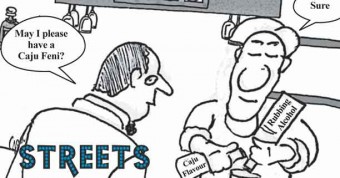Imagine you’re a police chief and you and your men have secretly surrounded the hideout of a dreaded fugitive. Now imagine one of those men shoots off his gun prematurely and alerts the gangster.
Nineteen years after it happened, advice the story of the Goa Police’s embarrassing failure in its first ever high-profile dragnet still hangs over the police force as a dark memory – and a lasting symbol of a widely-held perception of incompetence.
The police chief in charge at the time, Vilar Viegas, agreed to publicly discuss the unfortunate raid in one of the very few interviews he’s granted, and the first one in many years.
His surprising bottom-line assessment is this: Yes, it is true the police are incompetent. The problem, he said, is that they don’t know when to shoot.
The case of Abdul Gaffar made headlines not only because of the blunder, but also because of his untimely death in police custody a few months later. In addition to Abdul’s life, the episode claimed the reputations and careers of a number of cops, and laid bare myriad shortcomings of the institutions created to protect the security of Goa.
Those booked for Abdul’s death remain free today amid legal proceedings that still drag on nearly two decades after the event. In his interview, Vilar made another stunning admission: That he and his men were fully prepared to kill Abdul, who at the time was wanted for murder, robbery, armed assault and extortion, among other crimes.
“Yes, the team was psychologically prepared to pull the trigger at him if he resisted or attempted to flee,” Vilar explained. Eyes shaded by an old-fashioned peaked cap and a twirling moustache tickling his upper cheek, the 73-year-old former superintendent of police, who led the raid himself, offered a rare glimpse into the dramatic event which still looms large in Goa police lore.
In charge of the Margao police sub division, Vilar had received a tipoff that Abdul was hiding out in the woods near Loutolim village, in South Goa, otherwise known for its grandiose villas.
As one of the most active criminals of the time, who was politically backed and had a well-established network of informers amongst the police, Abdul was a prized catch. The gangster’s feared penchant for armed retaliation meant that gunning him down was one of the preferred options for the cops.
Were higher-ups or the government in the loop? “It was a decision I took. I was prepared to face the consequences. No, my superiors and the government was unaware of our ‘shoot if needed’ plan,” Vilar said. Within minutes of the tip off, a team of armed police officers and constables was cobbled up. Led by Vilar, the team drove most of the way to Loutolim, but covered the last few hundred metres to the Loutolim’s Vanxem area, where Abdul was hiding, on foot.
“At 4:30 am, we surrounded Abdul’s hideout. I took vantage position. But suddenly… boom … one of our men stationed behind the house on the hill pulled the trigger prematurely. I first thought we had got the man but it turned out we hadn’t,” Vilar recalls.
“That gun-shot triggered commotion. It brought nearly a dozen residents from the area out on the street at that pre-dawn hour. And among them was Abdul, who much against our expectations, made no attempt to flee but instead came up to me and asked “Saib … kittem zallam (Sir, what’s the matter?),” he said.
So yes, in the end Abdul was nabbed, albeit only briefly. Vilar will not admit it on the record, but considering Abdul’s ultimate fate, it is reasonable to assume that Vilar’s team approached the raid with the intention to kill the fugitive. Yet the sudden presence of civilians following the wayward gunshot meant the hoped-for kill – ideally conducted in isolation in the absence of witnesses – was off.
Vilar said a search of Abdul’s hideout revealed a couple of loaded guns and stashed ammunition. He was taken into custody, but only until Abdul’s godfathers sprung him out of the police lock-up again.
Ten months later, after he was arrested for another crime, Abdul was beaten to death by the cops. Among those who were hauled up for the custodial death was Vilar’s brother-in-law J. O. D’Souza, who had replaced him as head of the Margao police sub-division.
It’s been 19 years, so it’s easier now for Vilar to be candid. What does he think of Abdul’s death in custody and all its repercussions? “Yes, yes, all that … would not have happened if we had got him in the encounter.”
D’Souza was ultimately acquitted, but two of his subordinates – police inspector Sebastian Caiero and constable Savlo Naik – were convicted. Caiero and Naik challenged their conviction by a lower court and won their appeal in the Bombay High court. The state however has appealed against their acquittal in the apex court, which is still adjudicating it.
According to Vilar, not being trigger savvy nearly 20 years ago cost the police force dearly in terms of reputation as well as morale. And the tough ex-cop says things haven’t changed much now. “If they do pull the trigger, nine out of ten of them don’t know where the bullet will go,” Vilar says.
Inspector General of Police Sanjay Singh disputes this notion. “Our officers are adequately trained as and when the need arises. All I can say is they should not be found wanting when the occasion demands. Our fire-arm training protocol meets the requirements of the force,” Singh said.
Unfortunately, the requirements themselves might be the problem. According to the state police manual, policemen in Goa are only mandated to practice shooting once a year.
But even if they could shoot perfectly well, and even if Abdul had been killed in the raid and not in the lockup, there is one question neither Vilar nor Singh nor anyone else in the establishment has bothered to ask: What price do we pay as a people for extra-judicial killings?




